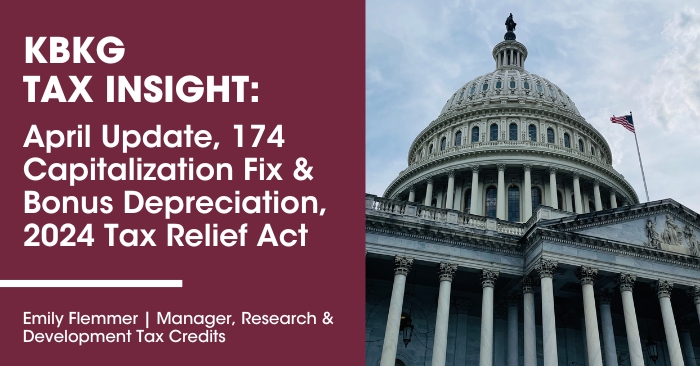KBKG Tax Insight: April Update, 174 Capitalization Fix & Bonus Depreciation, 2024 Tax Relief Act
By Emily Flemmer | Manager, Research & Development Tax Credits
Frustration mounts among advocates of a bipartisan tax agreement initially approved by the House in January but has since hit a roadblock in the Senate due to Republican resistance. This proposed legislation, known as the Tax Relief for American Families and Workers Act of 2024, seeks to bolster the child tax credit (CTC) while reinstating certain business tax incentives eliminated to offset the costs of the 2017 Trump tax reforms, including section 174 research and development expensing and bonus depreciation.
KBKG Insight:
While there is bipartisan support, and the bill passed overwhelmingly in a divided House, negotiations are still underway in the Senate to garner the 60 votes needed; it appears the measure is still stalled for now.
While the business-related tax benefits included in the proposal garner bipartisan favor, Republicans are hesitant to advance the bill before the pivotal November elections, as they anticipate the potential for enacting a more sweeping tax overhaul should they secure a majority. Dialogue between Democratic and Republican lawmakers remain stalled, with key senators expressing reservations or outright opposition to the current version of the bill.
Senator Mike Crapo, a key negotiator in the talks, expressed frustration, stating, “If they succeed in cramming the bill through on the floor, then of course there’s no point to discuss negotiations.” The deadlock revolves around various issues, including concerns about fraudulent claims and the broader implications for tax policy.
Ron Wyden, Chair of the Senate Finance Committee, and a pivotal figure in shaping the legislation, has reached out to Republican colleagues in a bid to secure their support. However, many rank-and-file Republicans are reluctant to endorse the bill without significant modifications. Some are advocating for amendments to include provisions such as compensation for victims of radiation exposure, while others raise concerns about the bill’s funding mechanisms and timing.
While Democrats are eager to see the bill move forward, Republicans are divided, with some voicing support for certain aspects of the legislation while others remain staunchly opposed. Senator Thom Tillis expressed active opposition stating he is “actively trying to kill the proposal for numerous reasons,” including the retroactive expansion of the CTC and the elimination of the employee retention credit, which serves as a significant revenue source for the bill.
Despite the obstacles, Democratic senators remain enthusiastic about the proposal, urging for a prompt vote on the bill in its existing form. Nevertheless, the fate of the bill remains uncertain, with business interests emphasizing the urgency of advancing the legislation during the upcoming May legislative session.
Neil Bradley, chief policy officer with the U.S. Chamber of Commerce, emphasized the critical juncture, stating, “We’ve clearly reached a make-or-break moment.”
Emily Flemmer | Manager – Research & Development Tax Credits
Emily Flemmer is a Manager with KBKG working for the Research and Development (R&D) Tax Credit department. She has over seven years of consulting experience providing federal and state R&D credit services to companies in a variety of industries. Her relevant industry experience includes but is not limited to software development, retail, aerospace and defense, manufacturing, automotive, and pharmaceuticals. Read More



